- Home
- Richard Wright
The Flesh Market Page 3
The Flesh Market Read online
Page 3
Still a little breathless from his march to the school, Knox turned first to William. "You have seen it? What condition is it in?"
"I have not. Paterson raced on to meet our donor as I dressed, and had him bundle it into one of the dissecting rooms." He pointed to the door at the back of the lecture hall. "I wanted to wait."
Knox sneered, the boy's lack of ambition galling to him. "You were scared."
Fergusson's brow furrowed with confusion. "Of course." Knox immediately conceded that his student had been correct. Feeling anything but fear would have marked him as an utter fool. Yet the concession remained internal, and he turned to the donor.
"It is animated?"
"Oh aye, Doctor Knox. It's lively enough. Just what you wanted." The tall man's voice was deeper than so thin a chest would be expected to produce.
"You have it restrained?"
"At the wrists and ankles. Gagged too."
"Take me." Snatching up a lantern, he led them through the back of the lecture hall, into a gloomy corridor with several doors. The first four, two on each side, led to his dissecting rooms. There was little doubt where they had stored the subject. The banging from room two, on the left, made it clear.
"Told you she was lively," Andrew said from behind them.
"Silence," said Knox, turning to the skeletal shadow.
Fergusson, nerves emboldening him, shook his head. "Sir, surely it isn't aware enough to know we're here?"
"We have absolutely no idea what it may or may not be aware of, Mr Fergusson. That is precisely what makes it a valuable subject."
"Of course, sorry sir."
And there was the nub of it. Since the dead had risen over a year ago, science had discovered nothing more about them. They still appeared sporadically on the streets, though never in the numbers in which they had emerged during the Cadaver Riots. Where they were spotted, the Watch destroyed them without pause, taking no chances. If the Watch were unavailable, then mobs quickly formed to achieve the same outcome. It was well known that only the utter destruction of the body could stop the creatures, a rare example of a public information campaign that had proven effective, and the authorities encouraged the swift dispatch of the creatures. Harboring a revenant, even if it had once been the dearest of loved ones, was punishable by law. The fear of another mass outbreak drove all policy on the matter.
Knox had approached the civil authorities more than once in the previous months, arguing persuasively for a change in that very policy. Only knowledge would offer them true defence from these dark things, and that could not be acquired without appropriate study. Despite his best efforts, he had been ignored. Fear bested logic every time. If he intended to understand the threat then he needed specimens, but that would create a potential public health problem that the authorities would not sign off against. If even one such specimen were to escape, then chaos could fall once more over their city.
There would be no undead delivered to Surgeon's Square under civic licence.
It was maddening that those in power could be so short-sighted, accepting their ignorance so wilfully. Through his assistants and Paterson, who between them most often dealt directly with the donors who made nocturnal deliveries, he had spread quiet word that functioning revenants, should they be encountered in the normal course of acquiring supplies, might fetch a worthy price. It was a line he had been prepared to cross, a transgression that he knew he would be forgiven for when his discoveries were ultimately unveiled.
These solicitations had been made four months ago, during the academic hiatus, and since then he had waited in vain. Now the moment was upon him. An animated specimen, a revenant, thing of nightmare and horror. "Remember this day, gentlemen," he said in a whisper. "This is the beginning of the end, the turning point. From here, we build our knowledge, and make ourselves their masters." Again, the recurring memory of chaos, of nature and science twisting beyond all ken on that terrible September night. Knox held no fear of the revenants. It was ignorance that terrified him, and the Cadaver Riots had danced on the grave of everything he had thought he knew.
Fergusson nodded, while Paterson edged back along the corridor to within stepping distance of the theatre. The light did nothing to show what was in Merry Andrew's eyes, which were shadowed pits above emaciated cheekbones, but the big man's sigh was telling enough.
"Sounds a glorious future, so it does. Now though, is there no the matter of expenses?"
Knox looked at the door, and the ancient brown bloodstains that had sunk too deep into the grain to be scrubbed away. Their familiar shapes, imaginary lands of death and discovery on a heavy wooden sea, blurred at the edges. The longing to get down to work was a palpable force, but he nodded. Now was not, perhaps, the time. He was exhausted, and such an opportunity might not come again. Best not to waste it. "Of course. Expenses."
Turning his back on the room, and the creature that could unlock the future, he led them back to the lecture theatre. Paterson's audible relief at entering the better lit room was wearying. "Paterson, you're dismissed. Collect your things and be ready to lock up after us. Fergusson, can you retrieve the ledger?"
"I picked it up when I arrived," Fergusson said, nodding at the lectern. Knox stepped up and flicked to the current page in the thick book, skimming the many entries it contained. The penmanship denoted the long history of subjects that had been offered to the school, and the many hands that had signed them in. Records were everything for a business tracking its expenses, and while he had no love of accountancy he knew too that without measuring his outgoings he would never achieve the school's full potential. His own signature appeared in the ledger only occasionally, as did Barclay's before him. The bulk of entries had been entered by a succession of student assistants over the years.
Picking up the pen resting beside the book, he unsealed an inkwell. Dipping the nib in, he wondered what he should pay. Something generous, enough that the Graveyard King would brag to his associates and perhaps encourage them to risk a similar visit, but not so much as to make a fool of himself.
"I promised generosity, did I not?"
Merry Andrew nodded. "You did, sir."
Knox usually paid between seven and ten pounds, depending upon the state of the subject he was buying. "Fifteen pounds. Does that satisfy you?"
Andrew grinned, though Knox would have wished him not to do so. Horrible enough that the man could so easily be mistaken for a revenant when dour-faced, but when he grinned he looked like the Reaper himself. "Aye sir, that sounds about right."
As Fergusson paid the man, Knox scratched the date onto the page, and then 'Lees & Co,' an affectation they used to enhance the businesslike appearance of the official record. Such misrepresentation was dangerously close to acknowledging that some subjects may have been acquired in a less than legal fashion, but this too was something Knox chose to ignore. What did give him pause was the next line, which demanded that he describe the goods received. Could he acknowledge that he now had a revenant stored away in his dissection rooms? How far over the line could he step?
Cadaver, he scrawled. Exceeding fresh.
Chapter 3
Liam de Burca
Wednesday, October 31st, 1827
Perched on the back of McLiesh's cart, leaning on the cargo of dried hay with his legs dangling over the dirt, Liam stared down the Wester Portsburgh road and wondered if Noah had felt the same way as his Ark's cargo was loaded. There were animals following them as far back as he could see. Not the same variety that Noah had coped with, and far more than two of each, but the spectacle of a river of beasts must have been similar. On each side of the street people had stopped their business to watch, clustering in groups outside the shop fronts to point and gawp at the sight. Grocers and spirit dealers joined their customers under the cold Autumn sun, shaking hands in greeting as they watched the beasts go by, the spectacle no less engrossing for its annual repetition. Chatter and good-natured laughter competed with the lowing and bleating of the beasts to
create a jovial din.
Many spectators lifted hands to their noses, waving the smell of beasts and the mounting piles of fresh manure away in exaggeration. Liam smiled. Having travelled with McLiesh from Peebles he had grown accustomed to the aromas accompanying them, but not so the city folk. There were many livestock markets in Edinburgh through the year, but the one being held the next day, November the first, was the biggest and best attended. Many residents of the city made it their business to turn up, taking their children to see the mass of mad-eyed cows and sheep, the pigs and goats. Those in West Port were getting a preview. Many were Irish immigrants like him, who had gravitated to this part of the city to feel close to their countrymen, and no true-blooded Irish would turn down a free show if they could help it.
City dwellers. Residents. The townsfolk of Edinburgh. Liam took a deep breath to steady the rush of anxiety that surged through him, wondering how anybody could tell the odours of the beasts apart from West Port's own greasy stench of smoke and sewage, and sat up straight in the straw. From today he could be counted as an Edinburgh man. No more labouring on harvests to scrape together extra money to see him and Nelly through the winter. No more weaving or baking as opportunity arose, struggling to maintain a status quo that never satisfied. While life in Peebles, some twenty miles south, had been passable, Liam had never earned enough to purchase land or property. Five years taking what work he could was too long, and the time had come for a new start. Nelly agreed. "Trust to the Lord," she told him as she waved him away that morning. "What's for you won't go by you." If they didn't take their fortune in their own hands they would be doing the same in twenty years as they were now. Liam would be fifty-five, and aside from greyer hairs and failing muscles, nothing would have changed.
It was not the destiny he had sought when he first came to Scotland, a decade before. Back then, he had been prepared to pay his dues, taking menial, shattering work as a navvy. Alongside other Irish immigrants he dug and shovelled to build the Union Canal connecting Edinburgh to the existing Forth and Clyde Canal, creating a new and direct route to Glasgow in the West. Were it not for the long months and years doing that, he would never have met Nelly, so he could cite no regrets. On the other hand, he would never have lost his wife or children either. Life had moved on from those sad, confusing days, and all they had cost him.
Sacrifice was something he was prepared for. He was no stranger to hard graft, but a decade had passed, first on the canal, then in Peebles. Liam wanted to be his own man, had thought that by his mid-thirties this would be accomplished. Curving his spine up and back in a long stretch, he let his good mood drown the flickers of frustration such contemplation caused. Today was not the day for regret, was instead reserved for the optimism of a new beginning. There was honest work to be done. Over the last year, whenever he found time, he had learned a new trade, swapping spirits and banter in exchange for watching his neighbour Calum mending and making shoes. Liam had the knack of it now, and was confident of his own skill. Again he looked back along the street, over the animals, at the shop fronts stretching off, the austere tenements looming over them from behind. It was one of the major routes into the city, and he would not be the first to set up stall as a shoemaker there. That was of no consequence, for there was plenty of passing trade to be had, and Liam believed that he had secured an advantage over his competition.
Pulling his cap tight, he slid his buttocks to the rear edge of the wagon, and hopped down to the road between two goats. They skittered a step or two away from him, following his progress with wary, idiot eyes as he weaved through the small herd to the edge of the road. Turning, he shouted over to McLiesh. "I'm away! Grateful for the ride!"
McLiesh looked over his shoulder and waved. "You're welcome, Bill. Good fortune to you." As with many Irish immigrants, Liam had anglicised his name on arrival in Scotland. While among the Irish he would sometimes revert to Liam, William or Bill was how he more often introduced himself and the farewell shifted him back to it. Leave poor Liam to his baking and weaving in Peebles, he thought, and let Bill take on Edinburgh. Meeting McLiesh on the road had been a stroke of fortune, one he had consciously sought by choosing the day before the livestock market on which to travel. It was a long walk by foot from Peebles, and dozing in the back of a stranger's cart had been a far more pleasant resort.
Smiling at a woman holding her baby up to see the bestial procession, he glanced up and down the street to get his bearings, then weaved through the crowd with a spring in his step that had not been there just a month before.
#
Bill passed by Tanner's Close twice before he spotted it, partly because of the crowds and the noise, and partly because it was the first time he had ever been there unaccompanied. When he had last visited three years ago, to catch up with his old friend Jimmy Logue from the Union Canal days, it had been dark and the streets quiet. That was when he had first met Maggie, another Irish who had taken up with a Scot. It had been sad news indeed to discover, on recognising her in a pub on the Grassmarket while scouting the lie of the land last month, that Jimmy had died not long after that. Bill remembered only scratches of their last conversation as a dim, whisky smothered haze, but Jimmy had not been a happy man. While he couldn't be sure his memory was not playing tricks on him, Bill was certain there had been talk of infidelity, although whether on his own part or that of his wife was now lost to him.
Still, when he had come across Maggie in The White Hart he had found her content. Jimmy's death was news to Bill but more than two years had passed for her, and she was in no mood to share sad stories by the fire. There was a new man sharing her bed, one of their countrymen, which only spoke to her improving taste. Life had moved on.
He had joined her for several drinks, making her laugh as he had when he last visited. While she was plain company, she also happened to own a lodging house in West Port, the same one he sought now. When he carefully laid out his own hopes for he and Nelly as glasses were emptied and refilled, she was quick to offer accommodation at a reduced rate, for as long as he wished it. It never crossed his mind to feel guilty about his wilful manipulation. After all, he intended to pass only a few months at most with her. That would be enough time to establish himself and to find somewhere of his own, or so he hoped.
The archway into Tanner's Close led on to a passage cutting beneath a tenement block, but before Bill entered he spied a spirit dealer a few doors further along. Tonight was about first impressions, and in his experience few things made a better one than a man bearing whisky. Weaving through the crowd, he pushed open the door. The shop keep looked up from behind the counter with a smile.
"Afternoon, friend. What's your pleasure?" Another Irish, and Bill felt more at home than he had since those distant days on the Canal. It was good to know he was among his own.
"It'll be whisky for me, and two jars at that."
Nodding, the shop keep pulled down two stoppered stoneware jugs from a shelf. "New in town?"
Bill laughed. "So I am. What gave it away?"
"Oh, I know most people these parts. New faces stand out."
"Well, start getting used to this one, friend. I'll be around a while." He stuck out his hand. "Call me Bill."
"Pleased to meet you, Bill. I'm Tommy. Drop by anytime."
Bill counted his some coins onto the wooden top. "That I will. I'll be staying at Jimmy Logue's lodging house, round the corner?"
Tommy shook his head sadly. "Ah, you knew him? Shame he's not with us. It was never his house though. Always been Maggie's, and don't let her hear you say it different. She can be a fierce one, when the wind blows certain ways."
Bill winked. "Heard and understood. Grateful for the warning. We'll speak soon, and compare notes."
"You know where I am."
Bill smiled as he left the shop. Ambling back to the archway, he ducked inside, the chill shade like a cruel slap even after the tenuous touch of the Autumn sun. The close descended gently from Wester Portsburgh, and the sudden
stillness after the bustle of the crowd gave him pause. Though he could still hear the life on the street behind him, it was somehow muted, as though he had crossed a threshold and found himself in a new world. Determined not to lose his good cheer, he proceeded down the dirt path as it curved towards the bottom of the close. The low doors to either side of him were flanked by puddles of what might have been rainfall made muddy on the dirt, but were probably sewage. Even a step or two off the main road, no beauty itself as thoroughfares went, West Port was a midden. The sheer tenements either side of him trapped the bad air, which pooled with greater potency as he descended the pathway. He kept his ears open for the warnings any wife emptying her waste bucket through the window would cry out. It would not do to present himself splattered with piss and shit.
Armed with whisky, he allowed himself a little certainty about the meeting to come. Maggie gave him no pause, for he was confident in the strength of the first impressions he had made with her. It was her new husband he was wary of. While her generosity of spirit had been filled to overflowing after a few drinks, Bill had never met her new fellow, and was cautious. What man would be delighted to hear that his wife was throwing around expensive favours for the friends of the man who had preceded him in her affections?
Bill expected suspicion, even hostility, and wished he knew more about what he was getting himself into. It occurred to him that he didn't even know the man's name, and had never thought to ask. That would have been something at least, to be able to flatter him by pretending she had spoken of her husband. As it stood he was walking into the lodging house blind, knowing that the easy passing of the next few months rested on his performance. It was good to hear that, in her eyes anyway, the lodging house belonged to Maggie. It was his fervent hope that her husband, whatever he was called, viewed matters the same way. While meeting some spineless, wife-whipped cretin of a man might ordinarily make him cringe, today it would be cause enough to fall to his knees and cry Hallelujah to the blessed Almighty.

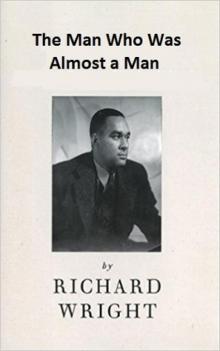 The Man Who Was Almost a Man
The Man Who Was Almost a Man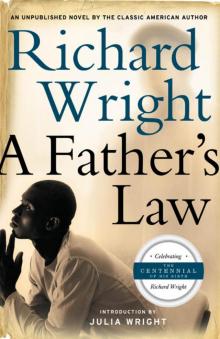 A Father's Law
A Father's Law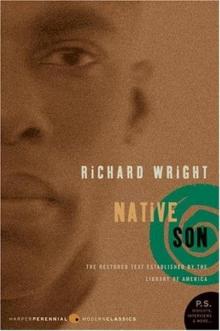 Native Son
Native Son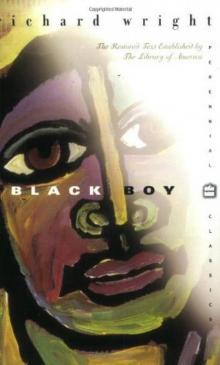 Black Boy
Black Boy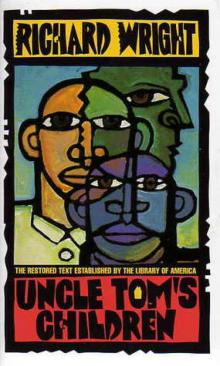 Uncle Tom's Children
Uncle Tom's Children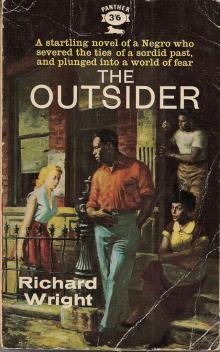 The Outsider
The Outsider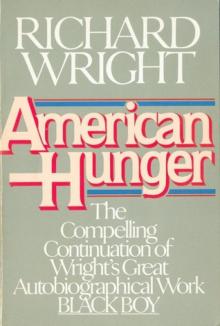 American Hunger
American Hunger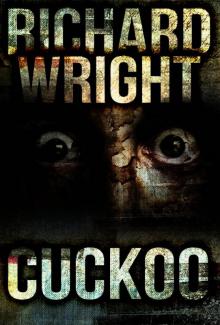 Cuckoo
Cuckoo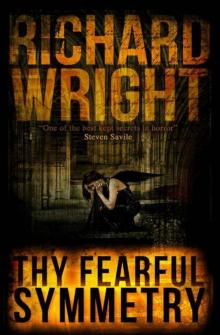 Thy Fearful Symmetry
Thy Fearful Symmetry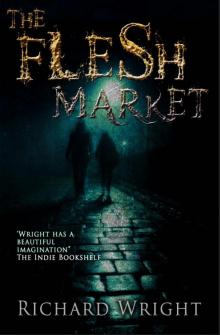 The Flesh Market
The Flesh Market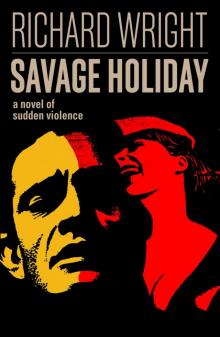 Savage Holiday
Savage Holiday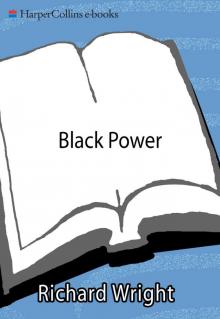 Black Power
Black Power